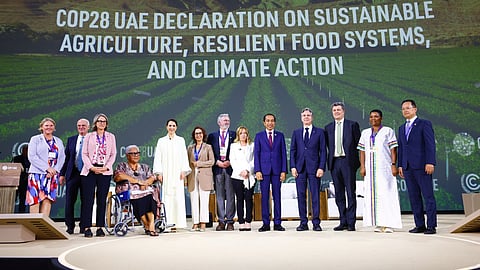

Thursday marked the end of the first week of the annual UN climate change summit. In many ways, this year’s COP or Conference of Parties has seen many firsts. The Loss and Damage Fund was operationalised, a health declaration was signed and 134 countries signed the Declaration on Sustainable Agriculture, Resilient Food Systems, and Climate Action.
This was the first time in three decades that agriculture and food systems featured prominently in a COP. According to research published in January this year, agriculture and food systems contribute to about a third of the total greenhouse gas emissions due to farming and land use, storage, transport, packaging, processing, retail and consumption.
“Countries must put food systems and agriculture at the heart of their climate ambitions, addressing both global emissions and protecting the lives and livelihoods of farmers living on the frontline of climate change,” said Mariam Almheiri, the UAE’s climate change minister and lead of COP28 food systems, in a statement.
The Declaration calls for integrating agriculture and food systems to be incorporated into national adaptation plans, nationally determined contributions and national biodiversity strategies. Nationally Determined Contributions (NDCs) are non-binding national plans for climate mitigation and targets for greenhouse gas emissions.
Several big emitters such as the United States and China signed the declaration. India did not. In countries such as India, where the majority are small and marginal farmers who are doing subsistence agriculture, imposing more restrictions on them in the name of emissions is wrong, said Rajashree Joshi, Programme Director of Pune based BAIF Development Research Foundation.
According to the updated NDCs, India has committed to reducing emissions intensity of its GDP by 45% by 2030. These need to come from areas such as construction, infrastructure development and transportation, said Dr Joshi. “And not from agriculture, as that might affect our food security,” she said.
“Methane generation from industry should be prioritised before agriculture,” said Myron Mendes, National Facilitator of Indian Network on Ethics and Climate Change (INECC).
The UAE announced USD 2.5 billion in funding for food security in vulnerable nations while combating climate change. In addition, the UAE along with the Bill and Melinda Gates Foundation will invest USD 200 million for innovations in food systems to tackle climate change.
“We have been fighting to keep the food systems away from large corporations because then we will be leaving them to market forces, which is not different from what we have now,” said Arnold Padilla, Programme Coordinator of Pesticide Action Network Asia Pacific.
Countries such as the Philippines welcomed India’s stand to not sign the declaration. “If a large economy like India keeps away from succumbing [to corporations and corporation-backed foundations, that is good news for all of us,” said a representative of a civil society organisation from the Philippines.
However, having sustainable agricultural practices will protect small and marginal farmers in vulnerable countries since they are on the front lines of unprecedented droughts and erratic rainfall. “This is another reason why India needs to put its farmers’ needs first,” said Dr Joshi.
According to a 2020 McKinsey report, sectors other than agriculture have identified many technologies that could sharply reduce emissions. “The sector also has a complicated set of objectives to consider alongside climate goals, including biodiversity, nutrition needs, food security and the livelihoods of farmers and farming communities,” the report said.
“The first step in reducing emissions from agriculture is to produce food as efficiently as possible, that is, to change how we farm,” it said. “A set of proven GHG (greenhouse gas)-efficient farming technologies and practices, some of which are already being deployed, could achieve about 20% of the sector’s required emissions reduction by 2050.”
Some vulnerable countries are asking for agriculture and food systems to be “economically viable and socially just” which they term agroecology. Agroecology integrates science with local and Indigenous knowledge and practice, emphasising farming in harmony with natural cycles and processes, and a political commitment to food sovereignty.
Azra Talat Sayeed of Roots of Equality, Pakistan said that the centre of decision making has to be the rural people, they already have a roadmap of sustainable agriculture, thus taking us closer to agroecology.
“It is critical that new initiatives advanced in the context UAE Presidency’s COP28 Food Systems and Agriculture Agenda – whether private or public sector led – embrace agroecological principles rather than promoting techno-fixes that prolong rather than transform harmful industrial models,” said a PAN AP statement released after the Declaration was signed.
Another major aspect of making food systems socially just is to ensure “we curb the rise of market-based finance and carbon offsetting,” said Kirtana Chandrasekaran from Friends of the Earth International. “This means we need to have grant-based government funding to move away from highly polluting agricultural practices,” she added.
(Raksha Kumar is a media fellow, Asia Pacific Forum on Women, Law and Development)
Join TNM and Newslaundry as we bring to you the most compelling reporting and analysis during the upcoming elections in Telangana, Mizoram, MP, Chhattisgarh, and Rajasthan. Click here to support our election coverage.